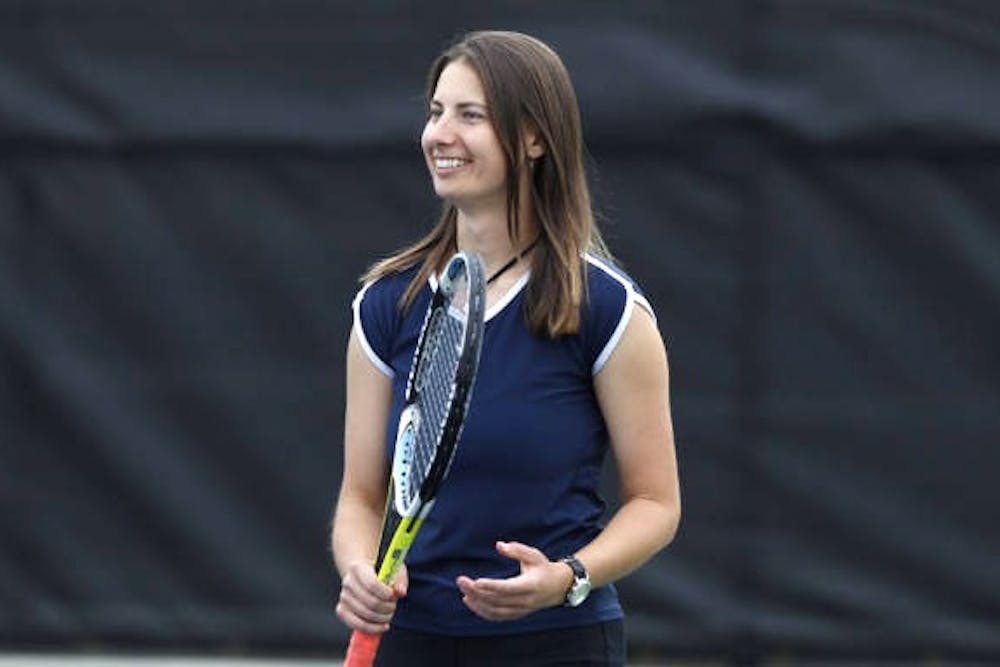
Penn women's tennis coach Sanela Kunovac has found success against all odds.
It’s a constant at any match. Arms crossed. Hat pulled down low. An intimidating but composed gaze. At big moments, she erupts with a fist pump and a “let’s go!””
Her players seem to feed on the energy.
For those who watch Penn women’s tennis coach Sanela Kunovac during contests, her passion for her team and the sport is obvious. And while many remember her as one of the program’s most successful players, most are unaware of her incredible and inspiring journey to Penn.
Kunovac was born in Bosnia where she lived an ordinary, peaceful life until 1992. That year, war broke out between Serbia and Croatia over what was formerly Yugoslavia. At the innocent age of nine, she found herself caught in the middle of the violence.
“The city was under siege. There were snipers shooting people on the streets. Bombs were falling,” she said. “We got help when — a few months into the war — the Children’s Embassy provided a safe passage for a group of about 70 tennis players out of the city and we ended up in Croatia.”
Kunovac was lucky. Although her father was forced to stay behind, her mother and younger brother were granted the freedom to escape with the group of young athletes. Her mother, a successful psychologist, was one of only two adult chaperones allowed to leave with the children.
“[The peace organizations] were worried that it was going to be difficult to keep the kids sane given the potential of war,” Kunovac said. “In a way, [my mom] had such a big responsibility of taking care of the other children that I had to grow up really fast to take care of my brother, who was five years younger than me.”
Bosnia later became fully involved in the war against Croatia. And as Bosnians living in Croatia, Kunovac and her family were asked to leave by the Croatian government. They relocated to Italy, where they stayed until the war’s conclusion in 1995, and Kunovac was finally reunited with her father.
But the war did not keep her from playing tennis. Even though Kunovac’s family had no income during the war, Croatian coaches saw her immense talent and continued to let her practice and play tournaments. She quickly became one of Europe’s best junior tennis players.
Once the war ended, Kunovac’s parents had to decide between staying in Bosnia with guaranteed high-paying jobs and moving to the United States to provide more opportunities for their children. They ultimately chose the latter.
With the help of World Relief, an organization that sponsored families moving to the United States, Kunovac and her family moved to Bradenton, Fla., home of the world-famous Nick Bollettieri Tennis Academy.
It was there that, while on full scholarship, Kunovac received an education and trained with some of the best young tennis players in the world. Her peers included five-time Grand Slam champion and former world No. 1 Maria Sharapova, as well as Jelena Jankovic and Daniela Hantuchova — both of whom have reached world rankings inside the top 10.
Like them, Kunovac’s dream was always to play professional tennis. For most of her junior career, she never even considered playing in college.
“When I was playing tournaments and would lose, people would always say, ‘Don’t worry, you can always go to college,’” she said. “I always associated college with the failure of accomplishing my goal of being a professional athlete.”
Kunovac, however, differed from her contemporaries in a major way: Her parents stressed that education came before tennis. While others dropped out of school, she went on to become valedictorian.
One day, Kunovac received a letter from Penn. Out of pure hope, the teenager called the program’s coach to ask if it would offer her a scholarship. The coach was stunned that she was even calling, assuming she had already turned pro. The next day, he flew down to Florida and convinced her to come visit the school.
“That was the turning point,” Kunovac said. “I fell in love with the campus. I remember walking to Franklin Field and feeling like this was one of the best stadiums you could have in any big city, let alone for it to just belong to a university.
“I said I would give it a shot and maybe try it for a semester or two before turning pro. The rest, I guess, is history.”
Kunovac led the Quakers to their first Ivy League title and NCAA Tournament berth, including a shocking upset over a top-15 team in Pepperdine in the tourney.
Years later, which Kunovac was in the midst of Ph.D. research at the University of Arizona, friends and former players convinced her to apply for Penn’s head coaching vacancy. She did. And she got the job.
Kunovac has demonstrated an amazing amount of strength and determination in her life. Tennis helped her escape the dangers of war, and she was able to make the most of a bad situation.
So it’s no wonder why she brings such passion to the court and her team every day.
The Daily Pennsylvanian is an independent, student-run newspaper. Please consider making a donation to support the coverage that shapes the University. Your generosity ensures a future of strong journalism at Penn.
DonatePlease note All comments are eligible for publication in The Daily Pennsylvanian.








